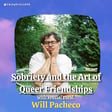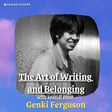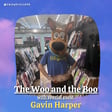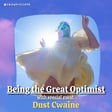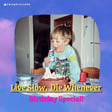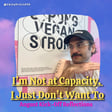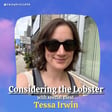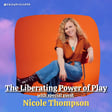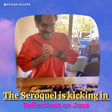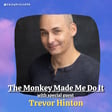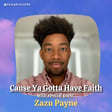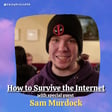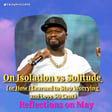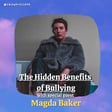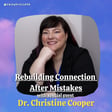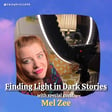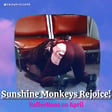Introduction and Episode Themes
00:00:08
Speaker
Well hey there sweet peas. Welcome back to Friendless, I'm Pal James. I'm Romanko, back with a brand new episode with very special guest, actor, producer, writer, Laura and Harris. Laura and I discuss the catharsis of the creative process, how you know when a friendship is well and truly over, and how to accept the inevitability of death without being too morbid.
00:00:31
Speaker
Laura was an incredible guest that I just had such a blast chatting with, and I think you're gonna love this one. So for now, lean back, get comfy, set your volume at a reasonable level, and enjoy my interview with the one and only Laura Ann Harris here on Friendless.
Reconnecting and Weather Talk
00:00:47
Speaker
So this week on Friendless, I have an old friend from the Phoenix days. I don't know if we've spoken since you graduated. I don't know if I've crossed paths with you. I've seen things around, but the one, the only, Laura Ann Harris, just to really get specific about it. So how the hell are you today? I'm really good. Yeah, I'm very good. How are you?
00:01:16
Speaker
I'm great. I'm great. It is Sunday. It is the sun is shining.
Fall Fashion and Spa Dilemma
00:01:20
Speaker
I've yet to really decide, you know, the weather was changing recently and I was feeling excited because, you know, the fall, like sweater weather is when I'm most powerful, you know, and the temperature is going back up again. So I can't decide if I'm OK with that or not, you know. Yeah, I'm on the fence, too, I think.
00:01:39
Speaker
I love the fall. I think it's just so cozy. And I mostly looked at my drawer and I'm like, wow, I really only have fall clothes. So I don't own a lot of summer stuff.
Balancing Creativity and Parenthood
00:01:51
Speaker
But I yeah, I just really love the fall. And
00:01:54
Speaker
but at the same point in time there's like a little kind of at-home spa near me that has like a like a cold plunge and a sauna and a hot tub and you kind of go around um don't know if it's legal but i don't care um i want to go but i'm also like would i want to go in the cool
00:02:16
Speaker
fall or would I want to go in the late summer heat? So I'm just sort of toying with that. But yes, you know, that's so interesting. I what would be the legalities of that? Why couldn't it be legal? I mean, I don't know.
00:02:30
Speaker
This is, this is, this is out of, uh, you know, this is out of bounds water temperatures. Uh, the crossover is, it has to be precisely 17 degrees. I feel like it has more to do with like the cleanliness, but I'm assuming it's fine. You know, but I'm just, I'm always like, is that legal to do it in your house, but whatever I'm like in their yard. I'm just like, right. It's the entrepreneurial spirit. You know?
00:02:56
Speaker
Mm-hmm, yeah. So for listeners who may not be familiar with your work, I know you do theater, you're a writer, you do all kinds of stuff. You're a new parent. Sure, we'll touch on that. But for anyone
Creative Process and Deadlines
00:03:10
Speaker
unfamiliar with you, I always put this question very bluntly. Who the hell are you? Yeah, that's fair. Who am I? That's a good question. I sometimes have to ask that question for myself as well.
00:03:25
Speaker
Yeah, honestly, like not even really joking there. I am mainly a solo performer playwright, but I have been kind of branching off into other forms. Like I'm writing fiction and a little bit of poetry and then also screen. Yeah, I'm writing a screenplay. I'm writing screenplays. Yeah, so that's what I'm working on right now.
00:03:52
Speaker
I love that. How do you find yourself balancing multiple projects like that? Because I know with me, like, I'll get these ideas and I'll get so excited about them. I'll dive into the first one and I'll get a new idea and I'll dive into the next one. But the first one isn't finished. And then inevitably because I'm like, which which none get done? You know, do you find do you find it beneficial for you to be working on multiple stuff or are you sort of is this is this maybe admitting a toxic trait inadvertently?
00:04:21
Speaker
It's a big toxic trait, yes.
Art vs. Capitalist Pressures
00:04:24
Speaker
I really fully appreciate people who constantly get seduced by the new idea. I tend to work a project into the ground and then I work on other things. I'm really obsessed with short form fiction because I feel like that's a little piece that I can finish and I feel good about it.
00:04:49
Speaker
That's not always the case. So I do finish things. It takes some time, but I do finish them. I remember before my daughter was born, I finished a new solo show and the first draft, or the second draft of this screenplay. And I was adamant that I had to do that before she was born because I was like, I won't have time to finish it. But then ironically,
00:05:18
Speaker
I'm starting a new screenplay and I'm also writing a bunch of short form fiction. So it's sort of, I don't know, maybe I was deluding myself. Maybe I actually did, I did have time. It's hard to, you know what, to be honest with you, it's really hard to find the drive with finishing something. I get it. It is a muscle to finish something.
00:05:42
Speaker
And to keep going. Oh my God. Oh my God. The ending is like its own muscle in itself, right? It's like if you're like, you know, if you're lifting weights or whatever, and you're like, this, this does this part of the arm and that does that part, there's like a whole like wrist exercise just for endings, you know, and being like, that is now done. And we're moving on. Yeah. And it's incredibly vulnerable and scary. Like it, you know, you don't know what
00:06:07
Speaker
what you're doing. Like I did an outline for this new screenplay. Is it really following it? Kinda. Not really though. And that's okay. I do better when I have like a kind of
00:06:22
Speaker
imaginary deadline. So I need to do a class. Like, and I just know a lot of creatives like this, they just need to have a class to kind of write for it. Doesn't mean that they're going to do well. In most cases, you're not going to do well, but it just is a way to, to finish.
Pandemic Challenges and Growth
00:06:40
Speaker
Um, with my solo work though, I kind of always know that in the, in the, in the horizon, I'm going to be performing this thing. Sure.
00:06:50
Speaker
that's my own kind of deadline, but I sort of, yeah, I just kind of knew I had to finish at least a first draft of that before my daughter was born. So yeah, I don't know if that answers your question at all, but I think, yeah, I just think I commend anybody who finishes a project. I commend anybody who's writing because it's very hard. Um, it's constantly tapping into yourself, into a part of yourself that may not,
00:07:21
Speaker
bring you the fruits that day. You know what I mean? And it's going to be a challenge, but, um, but when you surprise yourself, it can be really, really fun. And I think, you know, we're so conscious of the product and also making money off that product that we forget about the process and the process is the joy. And yeah.
00:07:46
Speaker
No, sorry, you're just, you're nailing that. The way you just framed it is such a beautiful, like, exactly, you know? And I talk about this with my therapist all the time, where, you know, I'm constantly talking about, like, what even is this? Like, how, you know, like, how does anybody do it? And I think by you saying, you know, you commit anybody writing, like, you know, my therapist has always said, like,
00:08:09
Speaker
all art is a miracle because it should be impossible, you know? And what is really hard to recognize when you're doing it and when you're in it is that you can look at other artists who you appreciate or you're inspired by or anything like that, but you're never going to actually walk their path. And so every single person who chooses to walk an artist's life is always
00:08:34
Speaker
just in the jungle, you know, they're they've got, you know, they're they're a little machete and there's no path for them. And because you can't say, oh, well, I like this playwright, so I'm just going to write there because that's already done. So you have to find a new way to write your story. And so every artist is constantly just in the jungle. And the fact that you can come up with anything, let alone something that you can love and be proud of. And then the next step being like someone else can love and be proud of like
00:09:02
Speaker
you know, that's a miracle. And I think everybody should always be much gentler with themselves. Like you say, because we lose ourselves in the product, we lose ourselves in the commodification and the cost of it, you know, and I don't know, I've been for a long time, I've been a big proponent of like, I just think
Collective Trauma of the Pandemic
00:09:23
Speaker
You know, capitalism has destroyed many things, but art and culture is right up there in one of the top tiers of like, it's just been completely removed from what the impulse of creativity is, you know? And it's, I don't know how we get that back, you know? I don't know either. Yeah, I don't know either.
00:09:49
Speaker
I'm striving just to practice, you know, go to the practice of writing, tap into what I want to say today. And ultimately the first audience is going to be for yourself. It has to be because everybody is going to be critical. And if you love it for like the most, that's, that's the most important thing. Um, yeah. So I think.
00:10:19
Speaker
you know, just keep writing every day. Even if you're like, there is no end in sight, just keep writing. And I think too, you know, I'm right on the same boat with you about like the like short fiction poetry, you know, like stuff that has like very confined space because then I can get that sort of dopamine boost of like, I finished this at least, you know, and like, yes, there's a grander story in my brain, but like,
00:10:44
Speaker
this is what it is now, and who knows what could be, but right now, that is done, and there's something very beautiful about having, you know, I always call them closed loops, but it's sort of like walls, right, having boundaries to it, right? What brought you to writing,
Coping with Personal Loss
00:11:03
Speaker
because I know we met through theater school, but was it sort of the impulse of creating stuff for theater initially, or was it just creative writing in general, or what attracts you to that form?
00:11:15
Speaker
Yeah, I mean, so in theater school, and actually I should go back, in high school I wrote something for a film class and I had a lot of fun writing my own script. Now, did I kind of take that impulse and explore it further? No, not really. I took a break from that for a while. And then in second year of university,
00:11:41
Speaker
I just decided to write a play because I was like, I'm not getting cast in things. I just, like I went through a pretty transformative time between first and second year. I went through a lot of depression actually, and I needed something to make me feel better. So I started improvising in front of my mirror characters, and then it kind of became a show. Yeah.
00:12:07
Speaker
Um, so I did it at the Chilliwack Directors Festival. It was great. It was like, I think back to that and I'm like, wow, that was a pretty informative time on my career. Like I brought a show over to Vancouver Chilliwack area and did it. And it went really, really well. And they, the audience really enjoyed it.
00:12:30
Speaker
So from there, I just was like, oh, I'll write a show every year for this festival. I like, I never got into sad codes. Like I, it was so funny. It was just like, I only wrote for this little festival, but it ended up working out really well. And all the shows were vastly different from each other. So that sort of was a pivotal time for me. I mean, my first solo show I wrote at the back in the dressing rooms of the Phoenix, right?
00:13:01
Speaker
And I initially, yes, it was always to kind of showcase my work as an actor. But then, you know, with my first solo show, which is called Pitch Blonde, I toured it for 10 years. And it started to be more about the show than them, the performance per se, though they went hand in hand. Of course.
00:13:24
Speaker
Yeah, and then I've written two other solo shows since, and then now writing a fourth one. So yeah, that's sort of what happened. And from there, I met other people. I moved to Toronto. I focused on new play development. And
00:13:46
Speaker
met people there who went to UBC for creative writing and I pursued a creative writing masters and I graduated in May of 2020.
00:13:59
Speaker
Wow. Oh my God. Amazing. I had no idea you did the master's program. That's incredible. Um, how did that like, wow, you got in, like you got out right at the nick of time. I know. Yeah, I did actually. And in fact, I was, I was actually finished November 2019. So I just ended up doing an extra semester of work study.
00:14:22
Speaker
Gotcha. And then I graduated in May of 2020. Because I think the way they do it is when you defend your thesis, you have to graduate that semester after. So in the thick of it, in the thick of the lockdown is when I finished, basically, my work study. And it was kind of crazy, like work from home kind of scenario. And yeah, I ended up working out. But yeah, but thankfully, I graduated in May of 2020.
Post-Pandemic Societal Changes
00:14:49
Speaker
that experience like at the end with the pivot? Because I was teaching a bit and seeing all the high school kids having to just losing their minds going to online. I can't imagine what the stress of a master's must have been like. What was that experience like for you?
00:15:12
Speaker
I was lucky because I didn't have to do any of my master's classes or anything like that. That had all been finished. Like I actually finished all my classwork in the May of 2019. So I spent all my in-person classwork.
00:15:27
Speaker
It just so happened that friends of mine were really affected. We just pivoted to online learning. And to be honest, the class sizes are maybe only 10 to 12 anyways. I don't think it was the end of the world. It's certainly through some professors though. That was a very stressful time for some professors.
00:15:48
Speaker
acclimatized to online learning. So yeah, yeah, it was it was rough, I think for the grad class below me and below them. But I lucked out and and the one class that I was teaching the undergraduate level class, we really only stopped going in person mid March.
00:16:08
Speaker
So there wasn't, there was like six weeks left in the class anyway. So it ended up working out. Right. You know, it's funny, we were talking just before we started recording about this sort of like, there's this like really underlying.
00:16:22
Speaker
You know, I frame it as a trauma of like just that experience of the last three years and how like everyone around the world had to just radically alter their their whole lives. And then now that everything's, you know, settled back in.
00:16:39
Speaker
Everyone, I just, I find it so strange that it's like, we see all the ramifications, right? We see the housing crisis that came out of it. We see, you know, prices still soaring. We see all the problems that came out of the pandemic, but no one is really talking about that it
Capitalism's Impact on Art
00:16:56
Speaker
happened. We're all just sort of having this collective amnesia moment, you know? And I'm curious, what's your sort of like perspective on what's been, like, how are you seeing people around you sort of
00:17:08
Speaker
processing or not processing like the sort of fallout of that experience? Yeah, I feel like this is a pretty large question. And I have to preface this with a content warning. I am going to talk about a friend of mine who passed away. So I'm going to just let you know that ahead of time. So right before the pandemic, my best friend committed suicide. Thank you. So I was in deep grief.
00:17:38
Speaker
Yeah, the pandemic. And I wrote a lot during that time to kind of process through that. And I will say people were very, very generous during that time, including the little undergraduate class that I was paying for. Yeah, I looked back at the evaluations and people were so kind. I thought they were going to give me the worst evaluations during that time, because I was like, deep grief.
00:18:07
Speaker
not really present. And they, like, I remember one student said, wow, I'm amazed at how present they were despite the fact they lost a really good friend. And I was just like, I bawled my eyes out reading that. It was some of the, like the most kind. I was like, holy crap. Like I didn't anticipate this kind of an evaluation because I really didn't think I was there for them in the way that I know that I could have been.
00:18:32
Speaker
But we were all going through it. We were all going through this living grief, as I called it, during the time. And it was really hard, I think, for younger people. And I think my husband, he works with kids, and he really felt it. He's felt it even after the fact, even with adults. There's a disconnect when it comes to communication. And people are, I think, in some ways,
00:19:01
Speaker
are just not able to articulate how they feel in the same way that they did. Um, it's so big. Yeah. I think, and there's been like, and I think that this is just the political environment that we're in as well. I think there's been a huge, um, arrogance that's come out of it too. Like, uh, selfishness and a real lack of empathy, um, because it's like,
00:19:29
Speaker
Well, this terrible thing also happened to me. And also why do I have to adhere to what you need? I think that there's that coming out of it too. Like there were like anti-mask maskers. I think to a certain degree, anti-vaxxers as well, because I think they're like, Oh, only
00:19:46
Speaker
Oh, this was the argument that I hated the most. It's like only, um, bigger people are getting COVID. Yes. And I was like, are you fucking stupid? Like you're actually stupid. Like, cause they're like, Oh, we shouldn't like, you know, only people who are making bad life choices are getting COVID. I'm like, not necessarily dudes. Like, no, actually that's not true. And you perpetrate perpetrating that.
Mental Health Post-Pandemic
00:20:16
Speaker
is so, it's unbelievable. Anyway, so- There's tears of pressure, yeah. Yeah, so I just think we were all going through this grief, this sense of loss and what will come out of it in terms of like a lot of people loss of industry. Like for theater people, huge loss of industry. Like I know so many professional actors who pivoted. They've immediately- And never went back. Yeah, and never went back.
00:20:45
Speaker
which I was so sad about. I was in a grief of losing some of those artistic colleagues. But it was fascinating to me, though, too, how quickly people pivoted. So it was clear to me that maybe this had been on their mind for a while. And maybe they needed to pivot. And I also feel like
00:21:13
Speaker
I don't know. There was also a kind of a sense of like, well, what did you expect this like life to be? Like it is going to be volatile even in the best of times. So I just, I thought it was really, really fascinating and interesting how quickly people pivoted and how quickly they were going to, they were like announcing, you know, by the way, I'm quitting, just letting you know, I'm quitting forever done. I'm never going to come back, but.
00:21:43
Speaker
If you like, okay, so there's a musician named Kathleen Edwards. She would famously quit. She opened a coffee shop called quitters in Ottawa. I don't know if you've heard this story. I have it. I love it. It's amazing. She literally was like, I'm quitting music. I'm opening a coffee shop called quitters. I am quitting. And what happens? Nine years later, she sells that coffee shop and she's back to being a musician. And I'm like.
00:22:12
Speaker
It's okay to say I'm going to just take a break for a while. Sure. And see what happens. We don't have to be this one and done kind of person. And that's the other thing I noticed. It's like it really brought out a lot of people being like very definite about things when clues were so volatile and uncertain. Exactly. Right. And I think like it's a really uncomfortable place to be in.
00:22:38
Speaker
But ultimately life is uncertain dudes. Yes. You know, like we're not, we're not going to know what tomorrow brings. Yeah. Sorry to say like I'm like, I'm going on a trip. I heard you in other episodes, uh, talking about Wells BC. Yes. And I'm actually going up to Wells to do my solo show. Yeah. Yeah. I'm excited about, but.
00:23:07
Speaker
I'm like pointing out to Chris, okay, here's my will because she never know. Exactly. Yeah. It's a crazy highway. That drive is like, it's beautiful. It's also terrifying, you know? Yeah. Yeah. So I'm just like, Kate, cause I, it's a trip that I'm going on on my own. I'm not bringing my husband and my daughter. So I'm, you know, I'm just letting you know. I'm like,
00:23:28
Speaker
There, here's my will just in case. Totally.
Therapy and Emotional Processing
00:23:32
Speaker
Well, and that's, you know, it's something so interesting about like, like you talked about like becoming really declarative and really definitive. And it was to me in a way, and I mean, obviously, you know,
00:23:44
Speaker
everybody had their own experience and there's no prescriptive answer to how everyone reacted to anything but it's like I definitely saw so many people becoming much more declarative much more black and white about everything you know whether it was about politics about their life about you know everything suddenly became really hard line in in every direction you know and and and it struck me that it was like a way to
00:24:08
Speaker
pretend you were in control of something because by showing just how out of control we actually were and how quickly everything can spiral into something brand new, it was like we were grasping at anything we could at least tell ourselves we were in control of, whether we actually were or not.
00:24:26
Speaker
And, you know, um, as I'm always talking about on the show, you know, what I talk about with my therapist is, you know, is, is unpacking that black and white thinking and getting rid of that, that type of thinking, because, um, like you say, you know, with this musician, like it's, it's.
00:24:45
Speaker
it feels more powerful in the moment to make these yes no always never statements but in the end you have no idea what's going to come so it's actually much more beneficial to you and to your sort of like the load you carry on your shoulders you know spiritually emotionally mentally
00:25:01
Speaker
Um, to say like, well, this is what works right now and it, and I'll negotiate a change when I need it, you know, and, and it might always work, but I'm not going to bank on that, you know, and, and I'd rather just like see what comes. Right. And, and, um, you know, I, I think, I think so many people had, it was like their first chance to just stop.
Boundaries in Friendships
00:25:23
Speaker
for, you know, so many of my friends had never been on something like an EI program. And so Serb was like a revelation to them to just like, oh, I'm just gonna stop and look, you know? And I don't think we were as like emotionally ready for that break to hit, you know? And so...
00:25:45
Speaker
Yeah, it's, you know, I hope everyone's okay. But it's like, I recognize that like, I don't think anyone's okay right now. I don't think, you know, it's that saying of like every, and this was long before the pandemic. It was the thing about like, anyone in the world you meet is like three sentences away from a complete nervous breakdown, you know? And I think it's even less than that now, you know? And we just don't know what to do with all this energy anymore, right?
00:26:14
Speaker
Yeah, I, okay. So I think some people are very type A and they're like, okay, I'm over it. And, and some people like me, I just have to sift through the sand for years and years and years and process the grief. And, um, and I think that that's, I, I don't know what's healthier. Like, and I also, I don't want to judge people on how they deal with things, but I think it is a similar way. Like when you've dealt with grief before in your life,
00:26:43
Speaker
the people who have not dealt with grief in the same way, it's like a different organism, you know? And I get it. I get that they will not really relate. They may not relate to the work. They may not relate to me. They may not relate to the idea of grief, but it does happen to people in their lives. And, you know, it's like any sort of experience, shared experience that you've had with a greater community,
00:27:12
Speaker
It's just some people are going to really tap into that and some people are not. And also it depends on who the person is, if they're more kind of type A and they just want to like, want to shut it down, bury it, put it away in a drawer, lock it up. That's fine. That's their MO. Um, but I think.
00:27:33
Speaker
You know, ultimately I'm just that kind of person I just like, and I wear my heart on my sleeve and I'm a cancer. So I like going deep into the dirt. And, um, yeah, so I think we're not, we're not going to really fully process this for quite a number of years. Um, there will be the one documentary that comes out there. They're like, Oh my God, it finally told me everything that I've been feeling. And I'm like, great.
00:28:00
Speaker
You know, but good for them. Good for them. But you know, it's going to happen. Oh, yeah. And everybody's going to be like, wow, like.
00:28:09
Speaker
They got it. It's going to be like, Oh God. Well, it's like, isn't it that thing of like, we don't know what we don't know. Right. And like sometimes, you know, I know for myself, like I know when I, when I'll be like researching, you know, I don't know, personality disorders, I'll be researching mental health or I'll be learning about something and I'll, and I'll hear a personal behavior reflected back on me with like a new term and a framing and of like, Oh, this is a symptom of this, you know? And, and it hits me like a sledgehammer because it's like, Oh,
00:28:39
Speaker
I thought this was just a thing I did but actually it's an output it's like a it's like a coping mechanism or it's whatever it might be you know and and I think sometimes it's that yeah like I say like people just don't even realize like I think some people are so I say this all often predominantly about like especially like men like cis men is like
00:29:01
Speaker
They're so not okay. They don't even realize
Navigating Friendship Dynamics
00:29:03
Speaker
they're not okay. They think that that's just what normal is just to be perpetually dysregulated and always kind of in fight flight and always trying to be dominant and all these things when it's like, no, that's a, that's like a coping mechanism or a survival tactic, you know, and you're not okay, sir. Yeah. I think unfortunately, uh, just in terms of, cause my friend who passed away was male and,
00:29:29
Speaker
Unfortunately upon, you know, the discovery, um, of what happened and his life, there was just so many things he wasn't able to work through and wasn't willing to work through with a professional. And I applaud you for going to therapy. I think it's a really vulnerable thing to do. And I certainly think it's important. I think, I think, um, men's mental health actually is really
00:29:56
Speaker
something that not a lot of people talk about. And also it's just this kind of sense, I think, you know, this, as you said, like this kind of survival technique to avoid that at all costs. I don't know what the, I don't get it. I actually don't understand why people don't, like not everybody goes to therapy. You know what I mean? But yeah, there's some sort of weird stigma with, with particular with cis males.
00:30:25
Speaker
I just think it's really vital for people to go because ultimately it really helps to talk things out. I mean, my husband and I chat about everything that we're going through. And I think it's really important for him to unload, you know what I mean? And I think, yeah, I, I, communication is the key and, and it helps kind of, it helps the mind muscle connection too, in terms of just,
00:30:54
Speaker
relaxation and it really can help destigmatize pain in your body too.
00:31:09
Speaker
something I talk about with a lot of my friends and my therapist is this idea of when there's trauma or there's pain or there's feelings, whatever the feeling is, right? Because all feelings are technically kind of, what's the word, is it benign? There's no good or bad feeling, there's just feelings and then if you repress them, they'll often cause pain and if you release them, they'll move. And so when you start getting those feelings moving, whether that's through talk or
00:31:38
Speaker
often with trauma work it's crying, you just cry and you get that energy moving out of you and the release behind that is so cathartic.
00:31:49
Speaker
You know, I've had a few experiences quite recently where I finally really tapped into some like really, really deep traumas and I finally figured out a way to sort of just get them moving through my body. And that often manifests in just weeping, you know? But then afterwards, it's like, yes, the memory is still there. Yes, the thought is still there, but it's like,
00:32:13
Speaker
just by getting it churned up, it's like, it's like, it's like churning the soil, right? It's like, yeah, it's still there, but it's like, it's different now it's moving. And it's like, you're kind of bringing the nutrients up to the top, you know, and it, and it, and it's passing through you in a way that, that is a lot more beneficial than like, no, it didn't happen. You know, whatever. I'm just not going to talk about it. You know, like, that's spooky, you know, right? It's a buildup of toxins. I think you're, yeah. Yeah. And it has dire consequences. Um,
00:32:43
Speaker
Yeah, which is why I'm kind of, you know, I think I did go through this immense amount of grief during the pandemic because of my the loss of my friend, but also because of the uncertainty in the world. But I'm in happy to say I'm in a much better place
Personal Growth Through Boundaries
00:33:01
Speaker
now. And I did have to go to talk therapy during that time. And it was really
00:33:13
Speaker
Really, the whole heart of this show is about what it means to be a friend. And the question at the core to begin with was, have I been a good friend? Because I think back. And I know for the vast majority of my life, I've got good intentions. But intentions aren't results. And I know I've caused pain. And I know I've caused joy. But in asking that question of, have I been a good friend, it doubles back to, well, what does that even mean? What is a friend?
00:33:43
Speaker
And it's yeah, it's become one of my favorite questions to ask everyone, whether on the show or not, because it's like everyone has a different answer, you know. And I guess I'm really, to start with, I'm very curious, how would you define what being a friend is or what is a friend to you? Yeah, I mean, to be fair with us, we haven't talked since university, but, you know, I've always enjoyed your presence.
00:34:10
Speaker
And I think from afar, we've both been jolly good fellows. I think, I love that saying, by the way, I really, I think that's the most perfect encapsulation of our friendship. I think it's fabulous. So thank you for that. I think, you know, I, what is a friend? I mean, I think friends are family. They do become your chosen family in a lot of ways. Um,
00:34:40
Speaker
And friends can be united in so many different aspects. They can be united because of a similarity in terms of lifestyle. It could be working friends. It could be artistic friends. But a lot of the times, I mean, my friends have sort of pseudo become siblings. Like they are people that I can kind of count on. I think the biggest thing for me
00:35:08
Speaker
And this might get into kind of something else I was curious about with you was, you know, I need a back and forth. At a certain point in time, if the friendship is only one sided, I'm unfortunately, I'm just not, I'm going to check out and I'm going to ghost hate to say it, but like it's going to happen because I, it has to be kind of like a,
00:35:33
Speaker
tennis match, it has to be we need to serve each other in terms of what we need. And luckily for me, a lot of my really close friends have been that and what
00:35:50
Speaker
is a downer for me is like, I thought I had that friendship with somebody and they've just kind of disappeared. And I, I understand though that things can happen. I certainly understand it post pandemic because people have sort of just drifted away. Totally. And I think part of it is pride.
00:36:12
Speaker
Cause sometimes when people leave the artistic world, they're like, I'm done with that chapter of my life. I cannot possibly.
00:36:22
Speaker
connect with that person again, because it's kind of too painful. And I'm speaking just general terms, like I've had friends, you know, even pre pandemic where that happened. And again, I'm just as if I have no clue if that's actually true. I'm assuming that could be part of it. And again, I'm not trying to like, say that that's the answer maybe and again, that's just my imagination of what's going on.
00:36:50
Speaker
Because what can be really toxic is you go, oh, it's because of me. Yeah. Right. It's something I've done. And I've been there and I've done that to myself. Big time.
00:37:03
Speaker
And it's unfortunately, I hate to say it, but like, it's probably not due to me. It's almost never. Yeah. If there hasn't been like, if there hasn't been like a direct communication, that's something I deal with all the time where it's like, if I haven't been directly told it is me, I have to really mindfully disconnect and be like, okay, it's something to do with you because it's like,
00:37:23
Speaker
If I can't know what, you know, coming back, I don't know what I don't know. So if you're not telling me, it's about me, I'm going to assume it's not because that's going to be safer for me in my body to be like, cool, deal with yourself. You know? And to be fair, sometimes it has been me. Of course, of course. Luckily enough, we've been able to have a conversation about it. I've been able to kind of, uh, apologize in the way that I need to. And.
Removing Toxic People
00:37:50
Speaker
You know, and that's, and, and, but even sometimes what's happened is I've apologized. We still aren't going to be the same as what we were. And you know what? That's okay. At least we've come to kind of an understanding of what happened and in order to move on or in order to kind of be like, we're just going to be at distance with each other. Well, I'm sure we're going to be cordial when we, when we, whenever we see each other. Totally.
00:38:19
Speaker
and hug and whatever and have good wishes, but ultimately this didn't work out. And that's really okay. I think, yeah, but when you don't get anything back, and even if you kind of go, oh, this isn't me, it's them, it is still a bummer though. Like there's still a grief process with losing that friendship.
00:38:47
Speaker
Um, it's a different kind of grief than like a loss of a lover, a loss of a family member. Um, but it's still, it's shitty. And I know people who have like had deep sadness about it. Um, I've certainly been there, but I'm just curious to know, like, have you ever kind of dealt with something like that and how have you worked through it?
00:39:10
Speaker
Yeah, big time. It's really interesting, actually. It's interesting timing for you to bring up a question like that, because I am sort of going through something like that right now with a couple friends who I've known for a long time. And it's just become really clear recently. The thing is that the break is actually coming from me. I'm the one who's sort of putting in the boundaries and setting the limits, because I've really recognized that where my life has gone,
00:39:39
Speaker
and where my values are now don't align with these people. And I'm not willing to, what feels like continue to mask around them to sort of make them comfortable. There's been a few instances recently where there's just stuff that they've said about people and culture. I'm a part of the queer community and stuff they said about members of the queer community.
00:40:08
Speaker
It just like does not align with me at all and so I've had to make you know It wasn't a big dramatic thing and I actually I tried to do a thing like you described earlier where I tried to talk about it with them and I tried to you know take ownership from my side of it and you know recognize when I was being belligerent or combative and express what hurt me about what they said and we kind of settled it but then I realized that that wasn't a
00:40:34
Speaker
going to be good enough for me. And I didn't want to make them keep on bowing to me and flagellating themselves for me. And so it's going to be just better for us to just wish you well. And like you said, if we see each other again, I have nothing but love in my heart for them. I just don't have the energy to spend time with them. And that might change. I might change. They might change. Something might change. Who knows? I'm not saying I never want to see you again.
00:41:03
Speaker
Um, but I just, yeah, I just don't have the energy and the time for it right now, you know, and, um, you know, you're right. It is a, there is a, a morning that comes out of that and there's like a trauma that comes out of that, but it is.
00:41:18
Speaker
It feels more healthy to me right now to not keep people in my life that I don't have the energy to align with. Social media has such a toxic ramification of making any choice you make be toxic. Either cut everyone out of your life who's a vampire or you're a bad person for getting people out of your life because you should be having people who
00:41:47
Speaker
you know, oppose your views, you shouldn't be, like, there's no way to win on social media. And so, I have to really remove myself from those conversations and just say, like, I hold love in my heart for them, but I don't have the time right now. And that has to be good enough for me. And not only does it have to be, it just, it is. That is good enough for me, you know? And I have nothing to prove to anyone else about that, because it's for me, it's for my body, it's for my well-being, right?
00:42:14
Speaker
Do I wish they were different? Do I wish I was different? I guess, maybe, but we're not. So why would I worry about that? You know, it's like, it's sort of a, it's a, the idea of like hypotheticals is exhausting, right? And it kind of wastes, it wastes your time and it wastes your energy because it's not how it is, you know? That's another big thing that my therapist is always on about where he's like,
00:42:36
Speaker
Yeah, you could talk about what you wish it was, but why? You're just like, is inevitably you're actually just hurting your feelings because that's not how it is. So either you can find something concretely to change that situation. And if it's about other people's behavior, then you can't change that. So stop trying to do that and just accept this is what it is and do what you need to, to make yourself feel better. And for me, the way it makes me feel better is to not spend time with them.
Career Choices and Creative Freedom
00:43:05
Speaker
Yeah, no, I completely agree with you on that I think So I'm I feel pretty lucky most of my friends have a similar moral compass I consider myself queer and that's never been an issue with any of my friends and it's never really come up as a point of confrontation
00:43:27
Speaker
And, but I do know that there's going to be people who ideologically differ for me, especially from high school, especially from other walks of my life in terms of where I work now in the US. Um, yeah, so it's, it's fascinating, but so I, I'm of two minds. One mind is, you know, I just don't engage with those people.
00:43:54
Speaker
And luckily, any of my close friends, I don't have to worry about that. Yes. Or I keep them somewhat in my life on social media, just so I can peek behind the curtain. Sure. Because I am fascinated by people who think differently than me, just from a writing perspective. Totally. Yeah. So I kind of like to sneak in and be like, whoa, that's a lot. I'm going to go back.
00:44:23
Speaker
Yes. Yeah. I think for me though, it's the worry of like, I think so many people, you know, one, one of the really deep dives I've been doing on myself recently is really figuring out like my attachment style, my people pleasing, you know, I've, I've really recognized that like, I have like an anxious attachment and it really manifests in people pleasing. And so I become like in my, in my flight response, I become fond and I become really like, Oh, sure. Totally. Yeah, absolutely. You're so right. Oh, wow. You know,
00:44:49
Speaker
And there's something very insidious about people pleasing that's very manipulative. And I've really come to recognize that I think a lot of people think that they can just logic someone else into being a different person. If they just find the right explanation, if they just find the right sentence, that'll change someone's personality altogether and they'll see the light. And what ends up happening instead is
00:45:14
Speaker
that other person who's clearly communicating who they are, what they think, and it's you who isn't listening to them, you know, you end up burning yourself out and then you hate this person because they're not changing. But it's like, you're the one who's trying to do something that's impossible. So just stop doing that and let both of you just go live. You know? I agree. Yeah, I completely agree. I mean, my late mother used to say, you can't people, you can't change people. And I was like,
00:45:44
Speaker
Mom, come on, like, you know, or yeah, they have to change themselves. I, or what did she actually say? Maybe I'll do a redo of that. My, my late mother used to say that, um, people don't change. Like she actually flat out was like, people don't change. And I was like, okay, come on. People can change. But I think she was right to a certain extent. I think the person needs to be self-aware to change.
00:46:13
Speaker
And I do believe in the power that people can change. And I think people change, unfortunately, based on their own experiences. That's exactly right. And that can't be really taught by the outside. So bless their hearts, Gen Zers, who want so hard for people to change. Bless them, bless them, bless them. But it's unfortunately, Hans, it's not going to happen unless they change themselves.
00:46:41
Speaker
And it is kind of going to be an interesting time for those Gen Zers to realize that as they get older. And I think it only comes when you kind of give zero facts about what other people think. And that happens in your 30s. And I think
00:47:01
Speaker
Oh man, I've been the, like I've, I've gone through the curse of people pleasing. Yeah, for sure. It's, it's awful. It actually makes me feel ill. Like it actually makes me feel uncomfortable and like not good. And I, and I had a, you know, I want to say five years ago or so I had a friend.
00:47:27
Speaker
through another friend in Vancouver, BC, during my master's, who I desperately wanted to be friends with. And they couldn't give two shits about me. And at a certain point, I was like, this person does not like me. I need to cut them out of my life because they don't make me feel good. They make me feel like a people pleasing whore. I hate to say that. Yeah, yeah. Like, I mean,
00:47:56
Speaker
Yeah, so and I don't mean to like, appropriate the term horror, I love the term. But anyway, I mean, like, you know, you mean like, pleasing nest of the horn is anyway, that's what I mean. Um, yeah, I just, you know, it was awful. And I just kind of, unfortunately,
Community Engagement in Theater
00:48:17
Speaker
ghost them. Like I kind of just went unfollow completely. I don't think they gave two shits of me. So honestly, I don't think it hurt their feelings, but it was, yeah, it was kind of rough. But such is life sometimes you just kind of, it just wasn't the right fit. We didn't, we didn't gel. So, and, and I was kind of proud of myself to know that, you know, I was like, you know what, this isn't working.
00:48:47
Speaker
You don't owe people explanations. You don't owe someone, this is why I'm doing this. You can just do it because it's for you. I think that's another element of it that's really exciting for me, but something I've never fully wrapped my head around.
00:49:02
Speaker
When I've heard it in the past, I've always been like, well, that's selfish. And it's like, no, no, no. You can just do something and not announce it. It's the thing about quitting. It's the thing about anything. You can just do a thing because it's right for you. You don't have to tell the person you're cutting them out of your life. You could just cut them out of your life. That's not actually a bad behavior. If anything, it's keeping both of you safe because then you're not creating more toxicity.
00:49:26
Speaker
Exactly. And the thing is, had this person wanted me in their life, they would have shown me and they did not. Bingo. So I'm done. That's it right there. But I think, you know, yeah, I, I'm proud of you for creating boundaries for yourself. I think it's really, really important. And I just, yeah, it's yeah, cutting. I think there was a quote recently, like, don't
00:49:56
Speaker
Like, yeah, I just cut the toxic people out of your life or something like, yeah, cut the toxic out of your heart or something like this. And I think it's really, really important. It's something that I will be teaching my daughter. Because we have such a tendency, I think as artists too, to kind of be like, like kind of groveling.
00:50:18
Speaker
For attention, for love, for opportunities. Well, the whole, you know, our school taught us, you know, be nice to everyone because you never know who's going to give you a job, right? So like, no matter how abusive, no matter how awful this person is to you, no matter how much they demean you, you have to stay nice to them because who knows, they might hire you, you know?
00:50:37
Speaker
Right. Yeah. But then I didn't want to work with those people. I ended up, there was one really bad audition that I had in which the person was at, see you next Tuesday, like just the biggest. And the experience was so toxic and awful that I was like, I would never work with this person. And I'm glad that I didn't. I'm really glad that I did not.
00:51:05
Speaker
I don't care who you are. If you're an asshole, I don't wanna be with you. I don't actually care enough to do it. I don't actually care enough. Because at the end of the day, I just wanna work, do my work, be respected. That's it. And yeah, for the most part, my experience has been good. I've had some toxic experiences though that I had to pull out of.
00:51:33
Speaker
So that really leads into, coming out of the friends, that leads into the next tier of the question. And I think speaking on the theatre community is such a vital example of it. The next stage of these questions is this idea of community. The newest element I've been implementing this season of interviews is
00:51:54
Speaker
you know you hear these terms of being community or you know your community or choosing to do all these things you know and and and it's another one of those words that ends up being like very nebulous and very very
00:52:04
Speaker
you know obviously very concretely definable but also very indefinable and and i'm i'm curious for you know in your estimation what does it mean to be in a community and and how do you how do you i guess you could put it either like how do you try to show up in your community or how do you see uh value of in showing up in community yeah it's funny that this comes out because i'm
Local Community and Artistic Identity
00:52:30
Speaker
now a newly elected board member of a children's theater here locally where I live in Vancouver, Washington.
00:52:37
Speaker
And I wanted to be a part of the board because I just since COVID, like we moved to this area during COVID, I've not felt really strongly connected to the community at all. So now for the next two years, I get to be a part of this board. And I'm really excited about that. I'm really excited to meet people. I love meeting new people.
00:53:00
Speaker
I love kind of sharing the joy of the work. I thoroughly enjoy the things that the theater does, like they have an education program, they have a production, like they have several productions during the year.
00:53:14
Speaker
Are they artistically necessarily in line with what I do? No, not necessarily, but that's okay. I mean, for kids, I mean, musicals are the thing and I get it. And I like that they do that. And I like that they do occasional plays too. Like they've done some interesting choices that I never would have thought that they would have done as a community theater show. And I'm like, oh wow, this is great. So my hope is that through this experience, I actually gain more
00:53:44
Speaker
community open-mindedness and also connection. I've been really fortunate in my theater career to connect with so many amazing artists on the road and in Toronto and Vancouver and Victoria. And they always are just so wonderful to see again. And
00:54:09
Speaker
you know, there's a certain level of social anxiety that I had growing up in my 20s where I don't know if you've had this experience where you see somebody, especially from the theater community, they're walking down the street and I felt like so much anxiety that I could not say hello to them. Do I say hi? Will they say hi? Will they know my name? And how many people like don't remember your name and all that kind of, and then suddenly you're like, oh, I'm an asshole and all the, oh yeah, I know that gymnastic gym or that that juggle gym very well.
00:54:40
Speaker
Yeah. So that happened a lot. Um, and luckily that's kind of not happening anymore, but, and there's also like this sense of, um, I don't know. There's some areas in Canada that are like wonderful artistic communities, but as soon as you step out of it, it's like you're dead. Like you're, you're dead. Yeah. I don't even know who you are anymore. Um,
00:55:08
Speaker
And that's okay too. Like I get it. They have like a weird sort of sense of jadedness and pride and also cliquishness, um, arrogance and, you know, I'm just going to be me. And if they aren't going to be.
00:55:25
Speaker
lovely open arms, then, you know, whatever. So what I'm trying to say is that I've been a part of both kind of communities, like this competitive kind of theater, comedy community. And I would hesitate to say like comedy community in Toronto, I was like dabbling in improv. And some people were wonderful, and some people were not. And it's like, you know, yeah, if
00:55:54
Speaker
Now I'm, I'm in a great spot where I'm like, I don't actually really care. If you don't want me to be a part of your community, I'm still going to do me and I'm still going to be happy. And the people who want to see my work will see my work. Um, but, uh, it can be challenging though, like especially different artists, artistic mediums, like I always will feel a little bit like a novice in every, in any sort of medium that I'm a part of.
00:56:24
Speaker
But, you know, it's for me, being in Toronto or being in Vancouver, BC, or being in New York, they aren't the end all be all for talent. Honestly, there's talent everywhere. If anything during the pandemic has taught me is that everyone is talented. I actually believe that. I'm like, talent is like oozing out of people's pores.
00:56:52
Speaker
And it's just what you do with it. And the luck, it's all luck. It is all luck. It's crazy. So yeah, the nice thing that came out of the pandemic is knowing that people are talented everywhere. There really are no talented cities or communities.
Conclusion: Friendship and Reconnection
00:57:15
Speaker
People are just talented. And they can live anywhere. And they can do anything.
00:57:22
Speaker
So that was kind of cool to discover during the pandemic, but I think, yeah, like I'm excited about having community where I'm living right now and kind of starting to dig into that. And it's still going to take a long time because nobody knows who the heck I am. That's okay. You know, they'll eventually know. And also I might not gel here. You know what I mean? I still have to tour elsewhere in order to find my audience.
00:57:52
Speaker
And that's really okay. And that's the inherent spirit of theater, isn't it? It's to be traveling. In a lot of ways, theater isn't supposed to be stationary. What you have done with your career is really what the soul of theater is.
00:58:11
Speaker
take your stories around and wherever you can you know and where there's people that's where theater goes you know like the idea of these sedentary theaters and these established theater brands is in a lot of ways kind of counterintuitive to the sort of soul of theater in my opinion you know um but that's maybe a whole other can of worms we shouldn't tap into just yet you know that's interview number two you know that's that's our second interview right
00:58:42
Speaker
Um, well, so, you know, the last big, uh, big question, um, before we just like wrap everything up, um, I always really love to leave listeners with like an actionable, something they can do this week to try. So I'm wondering if you have a suggestion of a practice or a tip or, or something that listeners could try doing this, this week to, to try and be a better friend. Oh, nice. Yeah.
00:59:07
Speaker
Well, it's funny. So I was looking through your podcast and I obviously listened to a couple of episodes before coming on today. And I saw that you have, you've interviewed a lot of my friends. Like genuinely like through six degrees of separation. We know, we know. Um, so one of my friends that you interviewed was Jenna Turk.
00:59:27
Speaker
Yes. Yeah. So I am going, cause I've been meaning to email her a question about something kind of totally unrelated. Um, but I'm going to do that this week and I think it's good. I mean, look, I, what I tend to do and actually one of my best friends does all the time too is just check in with people and to be fair, like.
00:59:53
Speaker
I have checked in with somebody around their birthday. They never got back to me. And it's not as if I'm not going to open the door to that conversation down the line, but I just kind of go, okay, this person has now officially ghosted me. I'm just going to let it go. I'm not going to communicate with them again, but you know, it's a kiss or a Sarah, you know, hope they're well. Um,
01:00:20
Speaker
But I will probably this week just kind of check in with a couple of people that I haven't checked in with in a while. And I should. I kind of want to see how they're doing, see how their summer is. It's always a nice time in the fall to check in. Totally. You're kind of like, oh, how is your summer? Because summer is such a wonderful time. So I would challenge the listeners to check in on somebody that you've kind of been meaning to. And you may not get anything back.
01:00:48
Speaker
And then you can kind of go like, okay, this person, I'm, I'm not going to communicate with this person again. Yep. You know, it's almost like the, it's that thing of like that, you know, cause I, I often will default to like, cause for me, like with, you know, with like my ADHD, I'll like see a message and I'll go, Oh, I should write back. And then I don't. And then I forget. And then, you know, and, and I don't expect other people to hold that for me. Right. But, but it's like, it is a little bit of a message from them of like, okay, I'm not within their like energy wheelhouse right now.
01:01:17
Speaker
that may change, but right now that's what I'm being shown, right? And so believe them and don't necessarily take it as an insult, but also like you say, like use that to inform what kind of energy you want to dispel, right? Like, cause you know, pushing for more isn't necessarily gonna help either of you, right? Yeah, exactly. The other challenge I have is there's this comedian named Mark Andrada,
01:01:44
Speaker
I hope that I'm pronouncing his last name right. But he posted something on his story which kind of alarmed a lot of people actually. He said, you know, take the time to tell the people that you love that you love them.
01:01:58
Speaker
Um, he just wrote that as a little message. And, but it was, it was a little bit more specific than that. And, and I was, I just said, yeah, this is very true. I hope, I hope you're well, because when somebody messages that on social media and it's kind of out of the blue, you do kind of wonder what's going on.
01:02:16
Speaker
Totally. I don't really talk to this person, but I was just like moved to message them. And then the next slide, I think 24 hours later, he's just like, I see that I've alarmed a lot of people.
01:02:30
Speaker
I just want you to remember to do this. Not for any reason specifically, but it just, you know, just as a reminder. I was like, that's lovely that he even just even followed up with that. So I would, yeah, I'm going to, you know, challenge people this week to also, yeah, tell the people who matter most to you how much you love them.
01:02:54
Speaker
Yeah. And I think I'm, I'm such a cancer. So I love small little gifts or small little surprises a lot, but they can be just a something I often like, if somebody asks for something, I give it to them.
01:03:09
Speaker
If it's small, like if, if it's like a huge thing, then it's like, okay, we have to have a negotiation. Like a conversation about this. For the most part, people just ask for small graces. And I often try my best to give it to them. I do often, like if people are doing like an indie go-go campaign and go fund me, I do give a little something. I don't have a lot, but I can certainly like give them the cost of a cup of coffee or what have you. Totally.
01:03:39
Speaker
So I help them out, you know? I love that. Yeah, so providing small graces for people. I think that's fabulous. Laura, you're incredible. You know, we're wrapping up the interview here.
01:03:53
Speaker
I've the whole time I've just been marveling at like you know you said it earlier about like we've always just been sort of like jolly jolly fellas you know and and and I you know and what a what a perfect encapsulation of our connection but at the same time too I you know you know you are such an example of of
01:04:11
Speaker
Something that I really cherish in this show is getting the chance to speak so much more closely with people who I always wish I had the chance for. And it's sometimes very difficult to be like, hey, Laura, I haven't spoken in 10 years. Do you want to have a phone call? So it's like, this is a bit of a cheat code for that kind of stuff.
01:04:33
Speaker
But I just I yeah I have seen the the career you've created for yourself and I've always been just so impressed and and I just, I really am grateful for for for this opportunity to just chat with you and get to hear your stories more and and I just think you're so fascinated and I'm just so glad that we got this chance and if
01:04:52
Speaker
If we speak again, that would be lovely. And if we don't, I hope you know that this has meant the absolute world to me. So, so, you know, it's, it can go either way and both are fine, but I just, uh, yeah, I, I absolutely adore you. So thank you for this. Yeah. Thank you too, James. I think what you're doing is such a wonderful thing. I think friends are, and the con, the topic of friendship is so vital. Um, I just think, yeah, I think you're doing a wonderful, wonderful thing. And.
01:05:22
Speaker
I genuinely love chatting with people that I haven't chatted with for a long time. I think in the past, my social anxiety really would prevent any sort of conversation like this. But I think I've done a lot of work on myself and I've, you know,
01:05:40
Speaker
Number one, I have nothing to prove to people. Number two, I don't need anything from anybody. And I think that that sort of kind of care enough, not to care mentality of my life has really, I don't know. I just, it's, it's brought me to a much better place. Um, and I would be a miss not to say that there's like some really genuine friendships in my life that have been so grounding and
01:06:11
Speaker
Yeah, I just think friendships are so vital to community, as you say, to our mental health and just talk. Yeah. Just cut out the toxic people. Honestly, honestly. Yeah. Cut them out. They're not, they're not worthy of our souls, of our, of our hearts, of our empathy, of our time. Um,
01:06:40
Speaker
Yeah. And then, you know, like if, if you find that somebody misunderstands you too, give them grace as well. Cause you don't know what what's going on with them. And, you know, they don't have to, again, there's nothing that you need from them. There may be nothing that you can offer them or they offer you, but sometimes it's just nice to give them grace because ultimately
01:07:10
Speaker
they're probably going through some stuff that you don't know about, right? So yeah, anyway, I just, I think what you're doing is really, really awesome. And I think you're a lovely, charming human being. And like, I kind of get mad at my former self and I talk about my like 20s as my former self because I feel like, oh, why, why did I miss out so, so long to chat with you?
01:07:36
Speaker
I think the exact same. I don't actually understand. Like I don't, I don't get it, but you know, I go, well, there's now. That's exactly right. That's exactly right. And that's something, you know, just to sound like a real broken record. That's something me and Scott, my therapist are always talking about where he's like, yeah, okay, you didn't do it, but you're alive. So, you know, is that something you want to do now? Cool. Then go do it. You know, it's fine. It's fine. You know, we're here now. And that's what counts, right?
01:08:03
Speaker
My very, very last thing, just plugging, just giving space, is there anything you like to plug, anything coming up that you'd like to talk about? Is there anywhere you would like listeners to find you, follow you anywhere?
01:08:15
Speaker
Yeah, sure. I'm going to be in Wells, BC at the end of September. That is around 120 people who live there. No, I'm just kidding. Feel free. I'm going to be at the Sunset Theater for a couple of nights at the end of September with my solo show, Destiny USA.
01:08:34
Speaker
Um, you can find me at my website, which is Laura and Harris.com and with an E. Um, and then you can find me on social media. Probably the best one is my, um, Instagram, which is just Laura and Harris. I share the A for the Ann and the A at the end of Laura. That's encompassed. Um, yeah, that would be the best place to find me. I'm, you know,
01:09:03
Speaker
after my little gig at the end of September, I probably will just be in my house right now. And that's it. Beautiful. Yeah. Beautiful. Well, thank you so much. This is just so fabulous catching up with you. And yeah, I just, yeah.
01:09:17
Speaker
I think I've said it already, but I'll say it again. This has just been an absolutely fantastic chance to chat with you. And I hope you have a great rest of your day, because I'm going to be just flying high. Yeah. Oh, thank you so much. And yeah, ditto with you. I've really enjoyed this conversation. And yeah, let me know if you want to chat again, even if we're not recorded.
01:10:07
Speaker
That's it. Thank you one more time to Laura for coming on the show. It was such a pleasure to get to chat with her. You know, she really is one of those examples, as I say in the show, of someone who I always wish I'd known better, and I'm so grateful to have the chance to have caught up with her here for Friendless. Be sure to give her a follow online. All her links are in the show notes. And while you're there,
01:10:29
Speaker
why not sign up for the Friendless newsletter? It's a weekly update all about the show, what's going on in my life, as well as fun updates like a new playlist to listen to and sometimes new poetry or what I'm hyper fixated on that week because my audio HD has run rampant on my ability to regulate and implement my non-existent
01:10:52
Speaker
executive function. All that and so much more. Sign up in the links below. You will not regret it. But that's it for me this week, so I'm just gonna wrap things up here. Thank you so much for listening. I appreciate you so much. If you'd like to give the show a five-star rating, every review helps and it's free, so you got no excuse.
01:11:12
Speaker
Anyway, I will be back here next week with another brand new episode and I hope you will join me but I'm not gonna worry about that now and neither should you because we got a whole week ahead of us and that is then and this is now. So for now, all I'm gonna say is I love you and I wish you well. Fun and safety sweeties.

